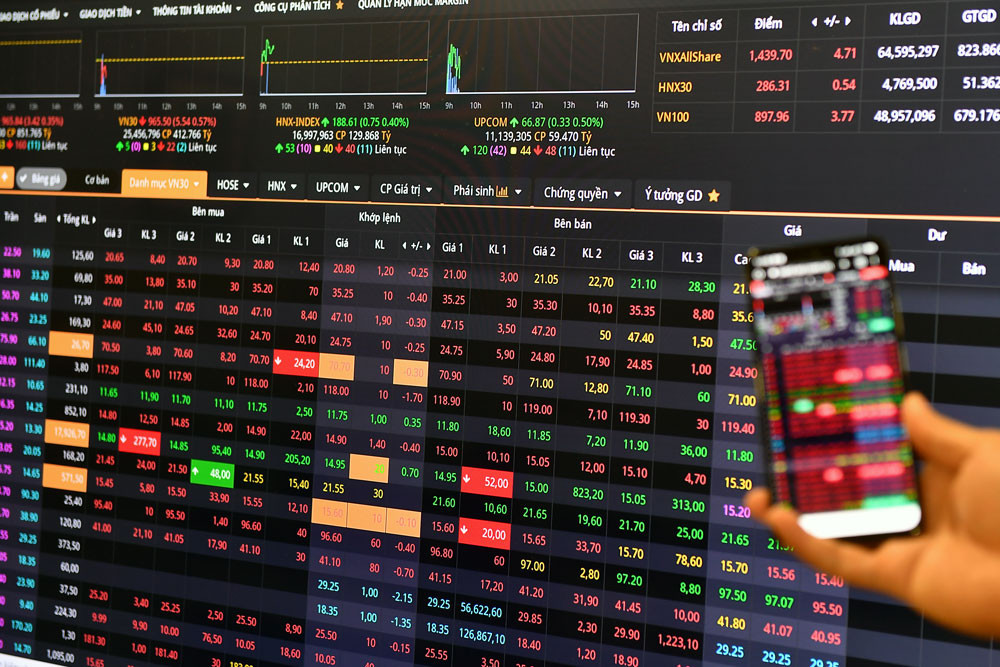
At a conference held on October 3, Nguyen Hoai Thu, CEO of VinaCapital, commented that Vietnam’s stocks are the cheapest in the last 10 years. The stock market has witnessed only three such attractive valuations like today if considering both the P/E (price to earning ratio) and P/B (price to book ratio)
The valuations in the Vietnamese market are more attractive than in other Southeast Asian markets. Business profit expectations in the second half of 2023 are better than the first half and the same period last year.
Prior to that, there had been positive assessments about Vietnam’s stocks in the medium and long term as the country had high economic growth amid global uncertainties.
Though the stock prices have decreased recently, MBS believes that the VN-Index may still hit the 1,300-1,500 point peak in 2024.
VNDirect Securities also believes that now is the right time to invest in securities. There is great investment potential with good business performance predicted for the third quarter, while market valuations have become more attractive partially because of the sharp fall in deposit interest rates.
Pyn Elite Fund predicted that the VN-Index may reach 2,500 points in 2025-2026 because Vietnam is one of the fastest growing economies in Asia with GDP expected to be above 5 percent in 2023.
Vietnam’s economic prospects are positive thanks to its high population and strong development of the middle class, rapid urbanization, and improved education level, as well as the flexible trade policy and stable economy.
The fund also noted that Vietnam and the US have become comprehensive strategic partners following US President Joe Biden’s to Vietnam.
Andy Ho from VinaCapital, who has been in the Vietnamese stock market for 20 years, said that the stock corrections recently are normal and this occurred after a period of sharp increases. In the long term, the stock market will continue rising in accordance with the economic cycle and listed companies’ profit growth.
Foreign investors have shown their interest in Vietnam’s stocks. At the 2023 investors’ conference, VinaCapital reported over 150 international investors, the highest number of attendees since 2005.
The Asian Development Bank (ADB) commented that Vietnam remains steadfast while global demand is weak. The institution predicted that Vietnam’s economy would grow by 5.8 percent this year and 6 percent next year.
Meanwhile, the World Bank predicted a growth rate of 4.7 percent for 2023, 5.5 percent for 2024 and 6 percent for 2025.
Cash flow weak
Though analysts believe that it is the right time to invest, cash flow to the stock market still has declined recently as domestic and foreign investors are relatively cautious.
At the trading session on October 5, when the VN-Index decreased by 15 points to the 1,110 point area, the liquidity in the market remained low, just VND13 trillion on HOSE (HCM City Stock Exchange).
In the first nine months of the year, the banking system once more witnessed a mobilized capital growth rate higher than a credit growth rate (5.8 vs 5.73 percent). Idle money keeps flowing to banks despite continued interest rate decreases.
Foreign investors do not show interest in Vietnam’s stocks at this time. Their net sale on HOSE reached VND700 billion on October 5. However, the net purchase of VND2 trillion was reported for the same day on the Hanoi bourse.
Meanwhile, some ETFs witnessed capital withdrawal, including Fubon ETF, DCVFM VNDiamond ETF and DCFM VND30 ETF.
In fact, withdrawing money from the market is a growing tendency globally in recent months, since the dollar has become more valuable than other currencies and geopolitical risks are increasing. In the last 1-2 years, safety, not profitability level, has been the top concern of investors.
Amid continued dollar appreciation with the price reaching the highest level over the last two decades, foreign capital flow to the US is unavoidable. The pressure of withdrawing money from frontier markets like Vietnam exists.
Even in the US market, capital is scanty. Vietnam’s VNG, a unicorn startup, has decided to postpone its IPO (initial public offering) after it realized that most investors are keeping a wait-and-see attitude.
Manh Ha